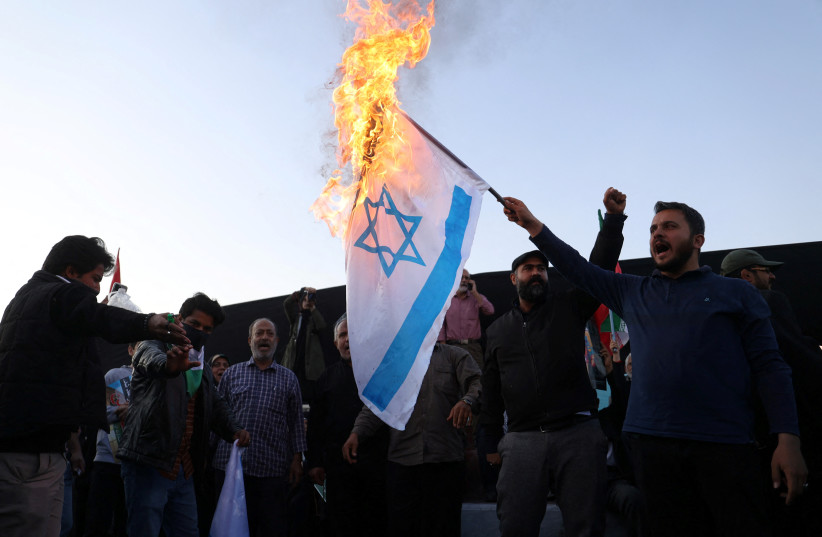Following Hamas’s attack against Israel on October 7, much analysis has focused on the military and intelligence failures that contributed thereto. It is, however, also important to learn from what the attack revealed about the nature and reach of the moral and influence campaign against Israel across the Western world.
In terms of armaments and training, the attack was enabled by Iran and specifically by the foreign wing of the Iranian Revolutionary Guard Corps. Such enablement is part of a broader strategy to incrementally encoil Israel, using various proxies, following which the Jewish state can be slowly constricted and ultimately destroyed.
This strategy required both arming, training, and radicalizing various paramilitary proxies across the Middle East as well as developing a diffuse influence and deception campaign in Europe and America to blunt, divide, and discredit criticism of Iran.
How Iran tricked the West
The essential message of that campaign was that Iran is not the threat its own ideology and incendiary rhetoric made it out to be — a message that was happily transmitted by sympathetic and naïve academic experts in Western democracies, some of whom possessed undoubted technical expertise on Iran.
For many Western policy makers that message had a seductive quality in holding that the threat from Iran was overstated, that Iranian revolutionary militancy was chiefly posturing, and that the Iranian administration was pragmatic and could be moderated if, instead of being confronted and contained, it was plied with financial incentives to reform.

The particular appeal was that if this were true, Western governments could scale back their Middle Eastern engagement with little threat to themselves through replacing policies of military confrontation and containment with economic and diplomatic incentives.
That appeal resonated particularly deeply among elite Western opinion formers given the rising tide of “woke” ideology in America and Europe.
Especially in the aftermath of the Occupy Wall Street and Black Lives Matter movements, a number of Western academic, civil society, media, and corporate institutions embraced what became woke thinking.
This taught its adherents that Western liberal democracies were inherently illegitimate and shameful, as they had been built on pillars of exploitation and oppression.
Worse was that Western cultural, political, economic, military, and governance institutions continued to perpetrate such oppression. Woke ideology therefore held that it was virtuous to oppose, discredit, and undermine the projection of power by Western institutions as such opposition was akin to supporting oppressed people globally.
The range of Western institutions embracing such thinking created a receptive climate of opinion for the idea that the West was a global aggressor, that a policy of confrontation against either Iran or its Hamas surrogate could trigger a regional conflict, and that neither posed a threat warranting harsh counter measures.
The extent to which that climate of opinion took root helps in turn to explain the extent of anti-Israel protests in Europe and America over the past week.
Because of its resonance and because the message came from individuals with undoubted Iranian expertise, many of those promoting it came to be consulted by governing administrations, think-tanks, and academic institutions in Europe and the United States. Some became trusted advisers to Western policy makers and took a leading role in shaping policy towards Iran. Contemporary American Iran doctrine, particularly as practiced by democratic administrations, was greatly influenced by this campaign and came to permeate much Western media reporting on Iran.
“Iran is in crisis but it suits everyone to exaggerate its power,” read a 2012 headline in The Guardian newspaper.
“Don’t assume Iran is the greatest threat” said Foreign Policy magazine in 2012.
“The threat from Iran is overblown” read a 2016 headline in The New York Times.
“Trump admin inflated Iran Intel, US officials say” read a 2019 Daily Beast headline.
“Iran threat exaggerated by GOP hawks” read a Washington Post headline in 2019.
SUCH PERMEATION was further enabled by the tens of millions of dollars that Qatar, an Iranian ally and direct funder of Hamas, spent supporting academic fellowships and the like at American universities, including at institutions as prestigious as Yale and Harvard. Qatar even bankrolled one of America’s most storied think-tanks to a level that raised the eyebrows of investigators at the American Federal Bureau of Investigation (FBI).
A primary consequence of the campaign was that key Western governments, policy makers, and media lost the ability to see Iranian behavior for the threat it so plainly was.
Iran’s nuclear efforts, some Western intelligence agencies even held, were not in pursuit of a weapon. Its support for surrogates across the Middle East, its convening of those beyond historical Sunni-Shia divides, and its technological advances in drone and missile technology heralded little of great importance. Its stated objective to eliminate Israel was just posturing that could be mitigated via rapprochement.
A secondary consequence is that the campaign disabled a unified Western response to Iran by widening divisions between “soft-liners” and “hard-liners.” The often-conservative analysts and politicians who warned of the extreme threat Iran presented were dismissed as prejudiced, and accused of provoking the very conflict they were desperate to prevent. These dismissals drew apparent authority from the rising tide of woke criticism of the nature of Western institutions generally.
The ultimate consequence is that Iran was afforded time, money, credibility, and diplomatic space it would otherwise not have had, to pursue its strategy of incrementally encoiling Israel.
The reason that many Western actors could not see the threat is because they had been led into believing it did not exist, and that even if it did, the measures required to counter it contradicted the rapprochement strategy they had been led into adopting.
Dr. James Myburgh was educated at Oxford and lives in Germany where he is the incoming CEO of the BRE-DE-RE initiative aimed at countering threats to liberty in democratic societies. Dr. Frans Cronje chairs BRE-DE-RE and lives in South Africa.
